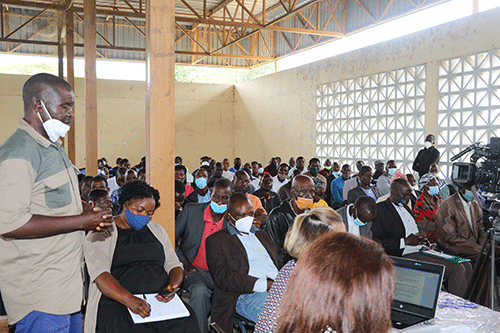A pressure group from the Zambezi region says the Bwabwata National Park should remain untouched and undivided to benefit the tourism sector by empowering marginalised groups who have lived in the area since time immemorial.
The Zambezi Development Association has come out in support of the Khwe (San) community living in the Bwabwata National Park.
This comes after the Hambukushu traditional authority’s leaders petitioned lawmakers to revisit a Cabinet decision taken in 1999 prohibiting communities in the Bwabwata national park area from owning cattle.
The traditional authority leaders came out guns blazing last week, accusing the government of taking away their livelihoods in the Bwabwata National Park at the expense of wildlife.
Similarly, the Khwe community that lives in Bwabwata also presented their petition, with claims of ‘oppressive practices’ perpetrated against them when it comes to their rights as Namibians.
Part of the claims is dispossession and disregard for land and land rights of the Khwe by government and fellow Namibians, a loss of access to land rights, refusal to recognise the Khwe Traditional Authority as well as growing inequality and poverty.
The Zambezi Development Association is a pressure group agitating for the rights of locals in the Zambezi region.
The association’s chairperson, Blessing Maanda, said the environment ministry should employ and empower the Khwe community living in Bwabwata, and provide guidelines to the community on how to live in the park.
Bwabwata was first proclaimed as the Caprivi Game Reserve in 1966, and upgraded to the Caprivi Game Park in 1968.
It was gazetted as the Bwabwata National Park in 2007. The park was declared a military area by the South African Defence Force during Namibia’s war of liberation, and the Khwe community already lived in the area.
“The Khwe community has the right to claim their land rights in Bwabwata, and not the Hambukushu people. It is not true that Hambukushu is fighting for the Khwe community. The true fight will be to allow and support the Khwe community to have their own traditional authority and a Bwabwata constituency to lead themselves, like all other tribes and citizens in Namibia,” he suggested.
Maanda opined that the claims by the Hambukushu leaders for land ownership in Bwabwata and the government’s shifting of Kavango East and Zambezi regional boundaries of the park will just create community conflicts.
Hence, he called on the government to respect and uphold old national and regional boundaries to prevent avoidable conflicts.
“Government and Hambukushu leaders are working hand in hand to create community conflicts in the western Zambezi because they are busy shifting both traditional and regional boundaries in the Zambezi region,” Maanda charged.
Kletus Karondo, who is the chairperson of the parliamentary standing committee on constitutional and legal affairs, said they undertook the recent visit to engage and collect facts on the issue.
As part of the committee’s findings, he said the Hambukushu community has expressed that after the proclamation of Bwabwata as a national park, the remaining land to be used for small-scale farming units has become very small.
“The Cabinet decision or directive of 1999 that no cattle be allowed in the Bwabwata National Park did not provide them with any other alternative where to graze their cattle. The Hambukushu maintains that Bwabwata is their ancestral land,” Karondo noted.
Equally, he said the multiple-use area of community-based tourism and trophy hunting, human settlement and development only benefit the Khwe people.
According to his observation, the Kyaramacan Association, through which benefits from the Bwabwata National Park are derived, only consists of Khwe-speaking people.
“The Hambukushu people are of the view that the consultation process on Bwabwata should be restarted, and they are requesting a commission of inquiry in this regard,” he added.
Meanwhile, Karondo said the Khwe people are not highly-educated.
Currently, they survive through wildlife conservation such as community-based tourism, trophy hunting concessions and the harvesting of Devil’s Claw.
“The Khwe community indicated that they are in support of the Cabinet directive or decision that prohibits cattle grazing in the Bwabwata National Park. Wildlife is the major tourist attraction in the park, and not cattle grazing. Bwabwata is their home, and they are calling upon the government to recognise them as a distinct group that should have its own traditional authority,” he observed.
The MP reported that the Khwe people are hungry for dialogue, and would like to continue engaging to find an amicable solution.
On the other hand, the Hambukushu maintain that they had always lived in harmony with the Khwe people since time immemorial, but that the Kyaramacan Association is busy disrupting that harmonious relationship.
– anakale@nepc.com.na


